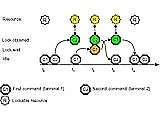 FLoM is a tool for synchronizing shell commands and avoiding complex workarounds. It manages process serialization not unlike "nice" handles their prioritization. It allows shell commands to be serialized and synchronized within a single system or a network. It requires little configuration to easily handle common settings.
FLoM is a tool for synchronizing shell commands and avoiding complex workarounds. It manages process serialization not unlike "nice" handles their prioritization. It allows shell commands to be serialized and synchronized within a single system or a network. It requires little configuration to easily handle common settings.
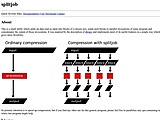 Useful to split up jobs over multiple CPU cores or even multiple computers. Examples: tar -cf - /bigdirectory | splitjob -j 4 gzip > big.tar.gz splitjob "ssh h1 bzip2" "ssh h2 bzip2" < f > f.bz2
Useful to split up jobs over multiple CPU cores or even multiple computers. Examples: tar -cf - /bigdirectory | splitjob -j 4 gzip > big.tar.gz splitjob "ssh h1 bzip2" "ssh h2 bzip2" < f > f.bz2
 JPPF enables applications with large processing power requirements to be run on any number of computers, in order to dramatically reduce their processing time. This is done by splitting an application into smaller parts that can be executed simultaneously on different machines.
JPPF enables applications with large processing power requirements to be run on any number of computers, in order to dramatically reduce their processing time. This is done by splitting an application into smaller parts that can be executed simultaneously on different machines.
 BitWrk is a peer-to-peer computation service that tightly integrates into Blender, the 3D rendering software. BitWrk greatly accelerates rendering by scaling to a swarm of computers. Fueled by Bitcoin, BitWrk creates an open marketplace where participants buy or sell computing power like stocks in a stock exchange.
BitWrk is a peer-to-peer computation service that tightly integrates into Blender, the 3D rendering software. BitWrk greatly accelerates rendering by scaling to a swarm of computers. Fueled by Bitcoin, BitWrk creates an open marketplace where participants buy or sell computing power like stocks in a stock exchange.
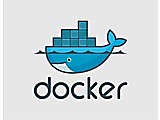 Docker is an open platform for distributing software application in containers. It utilizes operating system-level virtualization for process and full resource isolation through cgroups, capabilities, SELinux, AppArmor, netfilter, and Linux kernel namespaces. Its libcontainer is based on libvirt and lxc. Docker Engine is the application and environment packaging tool. And Docker Hub is a cloud service for sharing prepackaged containers.
Docker is an open platform for distributing software application in containers. It utilizes operating system-level virtualization for process and full resource isolation through cgroups, capabilities, SELinux, AppArmor, netfilter, and Linux kernel namespaces. Its libcontainer is based on libvirt and lxc. Docker Engine is the application and environment packaging tool. And Docker Hub is a cloud service for sharing prepackaged containers.
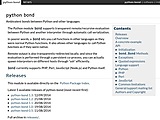 The Python module bond supports transparent remote/recursive evaluation between Python and another interpreter through automatic call serialization. In poorer words, a bond lets you call functions in other languages as they were normal Python functions. It also allows other languages to call Python functions as if they were native. Remote output is also transparently redirected locally, and since the evaluation is performed through a persistent co-process, you can actually spawn interpreters o
The Python module bond supports transparent remote/recursive evaluation between Python and another interpreter through automatic call serialization. In poorer words, a bond lets you call functions in other languages as they were normal Python functions. It also allows other languages to call Python functions as if they were native. Remote output is also transparently redirected locally, and since the evaluation is performed through a persistent co-process, you can actually spawn interpreters o
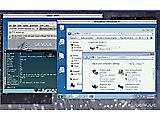 The Genode operating-system framework provides a unified application interface over different microkernel and hypervisor systems. It's a slim references implementations that runs atop Linux, L4ka::Pistachio, L4/Fiasco, OKL4, NOVA, Fiasco.OC, Codezero, and a custom kernel for ARM SoCs. Genode is designed for dynamic workload distribution while separating operation priviliges for rubustness.
The Genode operating-system framework provides a unified application interface over different microkernel and hypervisor systems. It's a slim references implementations that runs atop Linux, L4ka::Pistachio, L4/Fiasco, OKL4, NOVA, Fiasco.OC, Codezero, and a custom kernel for ARM SoCs. Genode is designed for dynamic workload distribution while separating operation priviliges for rubustness.
|